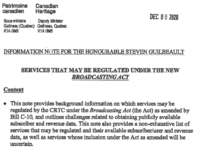The CRTC yesterday released its wholesale Internet rates decision, shocking the industry and consumer groups by reversing its 2019 ruling and virtually guaranteeing increased costs for consumers and less competition for Internet services. Indeed, within hours, TekSavvy, one of the largest independent providers, announced that it was withdrawing from the forthcoming spectrum auction and would no longer offer mobile services. In other words, the competitive and consumer cost reverberations from the decision will impact both broadband and wireless services. When the increased costs coming from Bill C-10 for Internet services are added to the equation, the Internet could get a lot more expensive in Canada.
Much of the blame rests with the government as it appointed CRTC Chair Ian Scott, who has presided over a dismantling of a pro-consumer, pro-innovative policy approach. Moreover, the former ISED Minister Navdeep Bains opened the door to this decision last summer by inviting the CRTC to re-examine the 2019 decision and current ISI Minister Francois-Philippe Champagne is seemingly completely uninterested in his own department’s digital files. I’ve written that this government has become the most anti-Internet government in Canadian history and the path that led to yesterday’s decision vaults to near the top of the evidence list.











